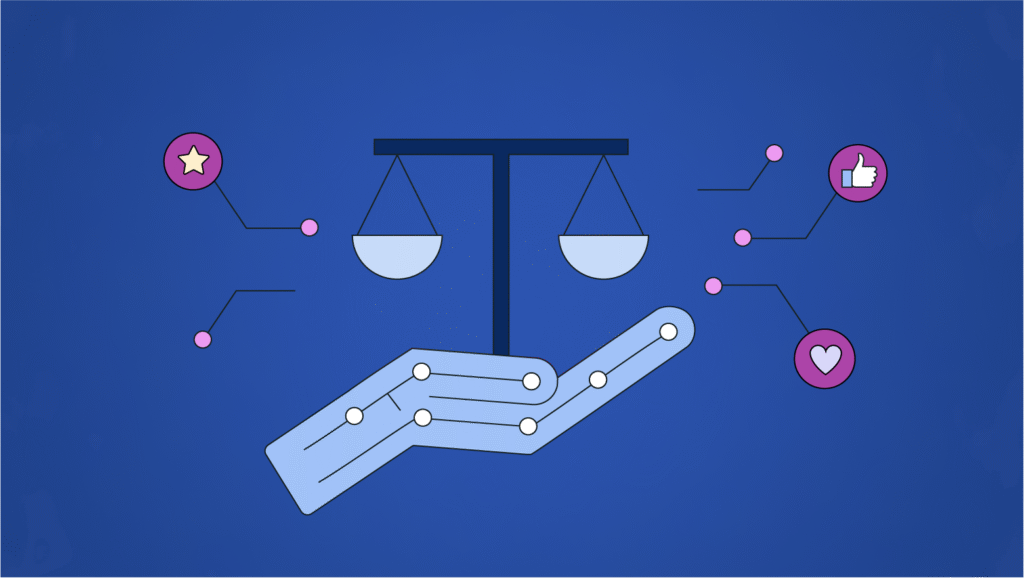What It’s About
Artificial Intelligence is changing how we live, work, and even think. But as AI grows smarter, the big question is: Should everything we can do with AI actually be done? That’s where ethics comes in. This article breaks down the real-life concerns behind AI and where we might need to pause and rethink.
Why AI Ethics Even Matters
AI is no longer just science fiction. It’s in our phones, cars, social media feeds, and even courtrooms. But who decides what’s right or wrong when machines make decisions?
Ethics in Artificial Intelligence is all about using AI in a way that’s fair, safe, and responsible. It helps us figure out where to draw the line before things go too far.
So, What Exactly Is AI Ethics?

At its core, AI ethics is a guide. It’s a way to keep technology in check and people protected.
Here are the main ideas:
- Be fair – Don’t let AI treat anyone unfairly
- Be open – People deserve to know how decisions are made
- Protect privacy – Data must be kept safe
- Take responsibility – Someone must own up when things go wrong
- Keep it safe – AI should never harm people
Sounds simple, right? But applying this in real life can get tricky.
Real Example: AI and Job Applications
Imagine applying for a job, but a computer reads your résumé first. The AI decides if you move forward or not. But what if it’s trained mostly on past hires — and most of them were men?
That’s what happened at Amazon. Their AI system started favoring male candidates. It wasn’t programmed to discriminate, but it learned bias from past data.
That’s a clear sign: ethics in AI isn’t just about code. It’s about what data we use and how systems are trained.
The Problem With “Black Box” AI
Some AI tools make decisions, but don’t explain how. These are often called “black boxes.”
Let’s say an AI denies your loan application. You ask why — but there’s no clear answer. That’s not just frustrating; it’s a problem.
People have the right to understand decisions that affect their lives. That’s why transparency matters.
Quick Snapshot: What Makes AI Ethical?
Deepfakes: When AI Gets Too Real
AI can now create fake videos that look completely real. These are called deepfakes. Sometimes they’re fun — like putting your face in a movie scene. But they can also be used to spread lies or hurt people’s reputations.
In politics, a fake video could be used to sway voters. That’s a dangerous line to cross. And right now, there are few rules stopping it.
AI in Weapons: A Risky Road
AI is even being used in military drones and weapons. Some systems can target and strike without a person pressing the button.
What happens if that AI gets it wrong? Or if a glitch causes harm?
Many experts say AI should never be in full control of life-or-death choices. But this tech is already being tested.
Who’s Making the Rules?
Right now, there’s no single global rulebook for AI. Instead, countries and companies are each trying to set their own guidelines.
Some efforts worth noting:
- The EU’s AI Act sets strict rules on how AI is used
- OpenAI promotes safe research practices
- UNESCO has drafted global AI ethics standards
But while the tech moves fast, the laws are still catching up.
What Can We Do About It?
You don’t need to be a programmer to care about AI ethics. Here’s what anyone can do:
- Ask questions – How is this AI tool being used?
- Think before you share – Especially when it comes to AI-generated content
- Support transparency – Favor companies that explain their AI systems
- Stay informed – The more you know, the more you can demand ethical practices
And if you’re in tech or design? Build AI that helps people, not just profits.
Where AI Shows Up (and Why Ethics Matters)

| AI Tool | Ethical Concern |
| Facial Recognition | Privacy, misuse by law enforcement |
| Credit Scoring AI | Bias, no way to challenge decisions |
| Social Media Algorithms | Mental health, fake news |
| Predictive Policing | Racial bias, lack of oversight |
| Self-driving Cars | Safety, decisions in crash scenarios |
Final Thoughts: Drawing the Line Together
We don’t have all the answers. But that’s okay.
Ethics in Artificial Intelligence is a shared conversation. It’s not about stopping innovation — it’s about shaping it with values we all care about: fairness, honesty, safety, and respect.
The more we talk about it, the better chance we have of using AI to make the world better — not more confusing or unfair.
FAQs: Ethics in Artificial Intelligence
1. What does “ethics in artificial intelligence” mean?
Ethics in Artificial Intelligence refers to the values and principles that guide how we design, build, and use AI. It ensures AI is used in ways that are fair, safe, transparent, and respect human rights.
2. Why is AI ethics important?
Because AI is now making decisions that affect real lives — from job hiring to healthcare to law enforcement. Without ethics, AI can reinforce bias, invade privacy, or even cause harm.
3. Can AI be biased?
Yes. If AI is trained on biased data or not tested properly, it can treat people unfairly. For example, some AI hiring tools have shown gender or racial bias in the past.
4. Who is responsible if an AI system makes a mistake?
This is a major ethical question. Responsibility often lies with the developers, companies, or users of the AI — depending on the system and situation. That’s why accountability is a core principle in AI ethics.
5. What is “black box AI” and why is it a concern?
“Black box AI” refers to systems where we can’t clearly understand how a decision was made. This lack of transparency makes it hard to trust or challenge the outcome, especially in critical situations like medical diagnoses or loan approvals.
6. How is AI used in ways that might raise ethical concerns?

Here are some examples:
- Facial recognition invading privacy
- Predictive policing reinforcing racial profiling
- Deepfakes spreading misinformation
- Autonomous weapons making life-and-death choices without human input
7. Are there any laws about AI ethics?
Some, but not enough. The European Union’s AI Act is one of the most advanced. Other countries are working on policies, but global regulation is still catching up to the speed of innovation.
8. What is the role of data in AI ethics?
Data is everything. If an AI model is trained on biased or incomplete data, it will produce flawed results. Ethical AI must be trained on diverse, accurate, and representative datasets.
9. What steps can companies take to ensure ethical AI?
Companies can:
- Test AI for bias regularly
- Use explainable models
- Be transparent with users
- Allow humans to override decisions
- Protect user data
10. How can everyday people help ensure AI is ethical?
- Ask questions before using AI-powered tools
- Support businesses that promote transparency
- Stay informed about how AI is being used
- Speak up if you see unfair or biased AI decisions
